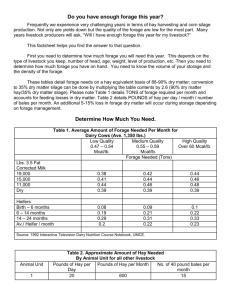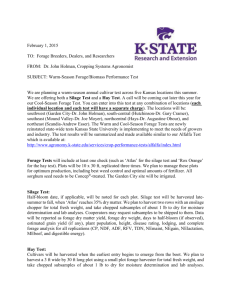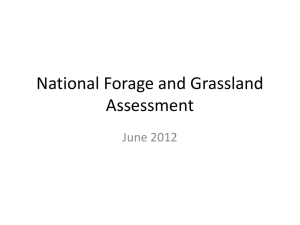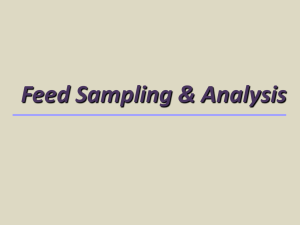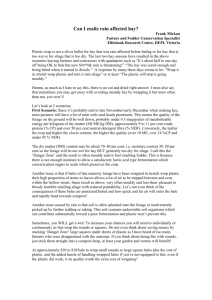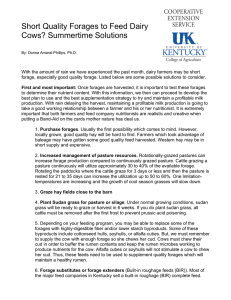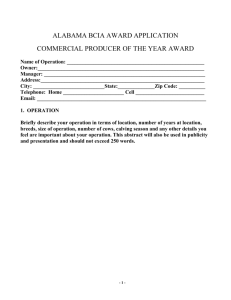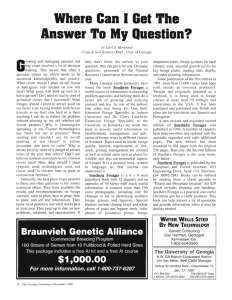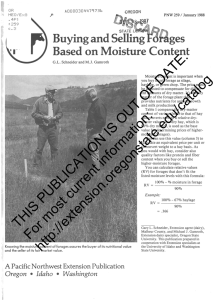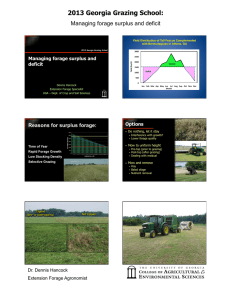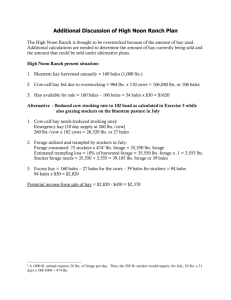plant/forage sample information form
advertisement
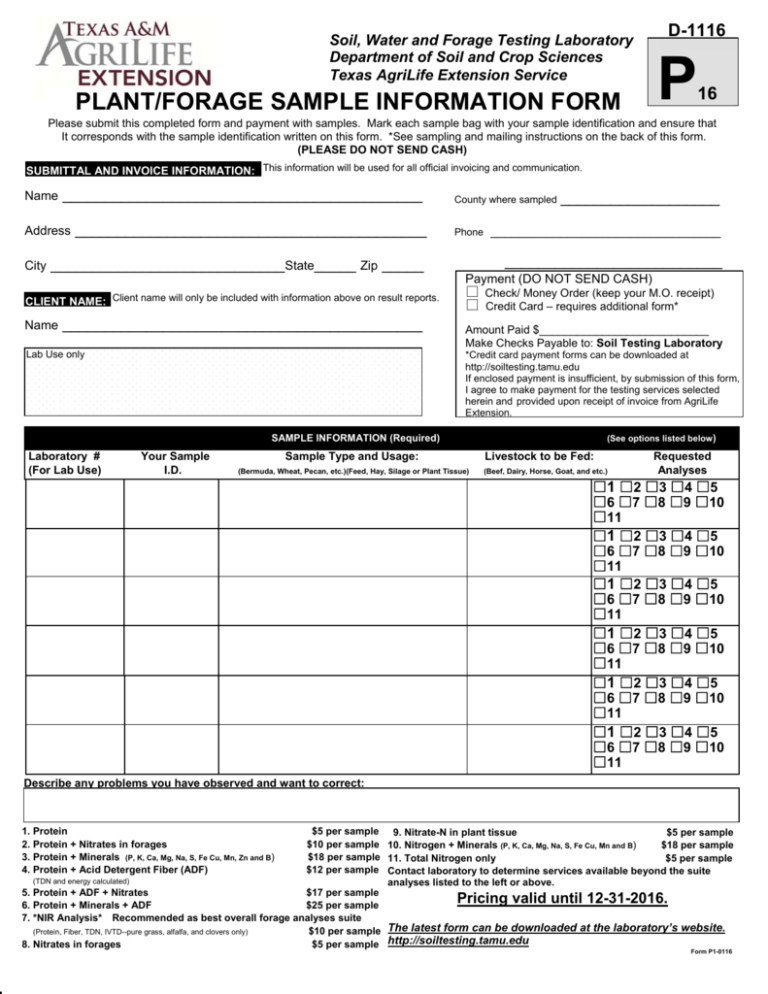
Soil, Water and Forage Testing Laboratory Department of Soil and Crop Sciences Texas AgriLife Extension Service PLANT/FORAGE SAMPLE INFORMATION FORM D-1116 P 16 Please submit this completed form and payment with samples. Mark each sample bag with your sample identification and ensure that It corresponds with the sample identification written on this form. *See sampling and mailing instructions on the back of this form. (PLEASE DO NOT SEND CASH) SUBMITTAL AND INVOICE INFORMATION: This information will be used for all official invoicing and communication. Name ___________________________________________ County where sampled Address __________________________________________ Phone ___________________ _________________________________ __________________________ City ____________________________State_____ Zip _____ Payment (DO NOT SEND CASH) CLIENT NAME: Client name will only be included with information above on result reports. Name ___________________________________________ Lab Use only Check/ Money Order (keep your M.O. receipt) Credit Card – requires additional form* Amount Paid $___________________________ Make Checks Payable to: Soil Testing Laboratory *Credit card payment forms can be downloaded at http://soiltesting.tamu.edu If enclosed payment is insufficient, by submission of this form, I agree to make payment for the testing services selected herein and provided upon receipt of invoice from AgriLife Extension. SAMPLE INFORMATION (Required) Laboratory # (For Lab Use) Your Sample I.D. Sample Type and Usage: (Bermuda, Wheat, Pecan, etc.)(Feed, Hay, Silage or Plant Tissue) (See options listed below) Livestock to be Fed: (Beef, Dairy, Horse, Goat, and etc.) Requested Analyses 1 2 3 4 5 6 7 8 9 10 11 1 2 3 4 5 6 7 8 9 10 11 1 2 3 4 5 6 7 8 9 10 11 1 2 3 4 5 6 7 8 9 10 11 1 2 3 4 5 6 7 8 9 10 11 1 2 3 4 5 6 7 8 9 10 11 Describe any problems you have observed and want to correct: 1. Protein 2. Protein + Nitrates in forages 3. Protein + Minerals (P, K, Ca, Mg, Na, S, Fe Cu, Mn, Zn and B) 4. Protein + Acid Detergent Fiber (ADF) $5 per sample 9. Nitrate-N in plant tissue $5 per sample $10 per sample 10. Nitrogen + Minerals (P, K, Ca, Mg, Na, S, Fe Cu, Mn and B) $18 per sample $18 per sample 11. Total Nitrogen only $5 per sample $12 per sample Contact laboratory to determine services available beyond the suite (TDN and energy calculated) analyses listed to the left or above. 5. Protein + ADF + Nitrates $17 per sample Pricing valid until 12-31-2016. 6. Protein + Minerals + ADF $25 per sample 7. *NIR Analysis* Recommended as best overall forage analyses suite (Protein, Fiber, TDN, IVTD--pure grass, alfalfa, and clovers only) $10 per sample The latest form can be downloaded at the laboratory’s website. 8. Nitrates in forages $5 per sample http://soiltesting.tamu.edu Form P1-0116 -------------------------Available Services------------------------Analyses are conducted on all feeding commodities including hay, pasture cubes, silage, green chop, mixed feeds and concentrates, as well as plant tissue samples and other plant materials (i.e., litter, composts or manure samples). All samples are analyzed with the understanding that the results are not in any way associated with feed control regulations. Sample Collection Field Sampling for Hay Production In 10 - 15 areas within a given location or field (not to exceed 40 acres), take 1 random subsample. Grasp a handful of the forage and cut at normal haying height. Combine all 10 - 15 subsamples and place into an appropriate paper sack or envelope (avoid using plastic bags, fertilizer bags, or feed sacks, as these containers may produce inaccurate results). Label sack or envelope with appropriate identification for field. Field Sampling for Grazing Purposes Sample as described above but cut at normal grazing height. Sampling Bales Use a Penn State or similar hay probe to sample hay bales (grab samples from the edge of the bale often provide inaccurate results). Take one core per each 5 large round bales (1 subcore for each 100 small square bales). Combine all subsamples and mix thoroughly. Package and label as described above. If a probe is not available, carefully collect representative samples by hand. Cut hay into stem lengths of 3 inches or less, carefully preventing leaf loss. Plant/Tissue Samples Collect approximately 25 leaves from representative plants. Rinse leaves with a 1% HCl solution and rinse with distilled water, if foliar nutrient applications have been made. Allow leaves to air dry, then package and label as described above. If it is not possible to wash the leaves prior to sending, please indicate so that the leaves will be washed upon receipt. Forage Samples Silage should be collected in sealable plastic bags. Forage nitrate samples should be collected from the lower part of the plant stems that might be grazed or cut for hay. The laboratory does not test for prussic acid in hay. NIR Analysis NIR analysis is valid only for cool season and warm season grasses, alfalfa, and common clovers. NIR analysis data are valid for protein, acid and neutral detergent fiber, TDN, and energy values. Other Sample Types Manure and litter samples should be submitted on the laboratory’s Biosoild form. Fertilizer and similar inorganic materials should not be submitted on either the Plant/Forage or Biosolid forms. Please contact the laboratory requiring its ability to process these type of samples. Shipping Samples Complete this information form. Enclose completed information form and payment in package. Verify payment check is made out to Soil Testing Laboratory. DO NOT SEND CASH. Address the letter and package to the following address (United States Postal Service): United States Postal Service Other Couriers (FedEx. UPS, etc.) Soil, Water and Forage Testing Laboratory Soil, Water and Forage Testing Laboratory 2478 TAMU College Station, TX 77843-2478 2610 F&B Road College Station, TX 77845 Phone: (979) 845-4816 Website: soiltesting.tamu.edu Email: soiltesting@tamu.edu Educational programs conducted by the Texas A&M AgriLife Extension Service serve people of all ages regardless of socio-economic level, race, color, sex, religion, handicap or national origin.
